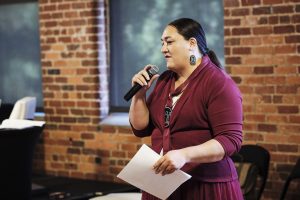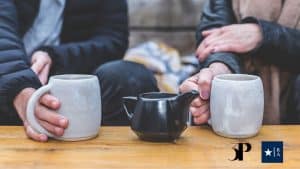
Prairie Rose Seminole is tending to her plants while she answers these questions. She’s just arrived home to North Dakota and will leave in a day to travel again.
Seminole spends much of her time on the road. As the American Indian Alaska Native Program Director for the Evangelical Lutheran Church of America (ECLA), she travels to Lutheran churches across the country.
She also travels with national organizations that train candidates, campaign workers and activists. At the Rural Women’s Summit in October 2019, Seminole led a VoteRunLead workshop equipping summit participants to run for office.
After a sudden and scary health episode in 2019, she’s trying to learn to take things slower by taking a short break from work each month. She wants to enjoy things at home, like gardening and her family.
“I’m in my own crisis mode because there’s so much work to be done,” she said. “This year I’m trying something new: learn to relax a little.”
Her position with the Lutheran Church was open for seven years before she was nominated to fill it, so there’s a “hunger for me to be everywhere.”
While she is trying to rest more, she continues the ambitious work of representing native people in a predominantly white church culture.
“The ELCA is on a good trajectory to be the church they are called to be,” she said. “I’m more hopeful these institutions can change.”
Her work is rooted in making a positive difference for native people through public policy, community organization, education, and now – to her own surprise – faith communities.
“That’s not a job I thought I would actually ever have,” she said.
Q: How did you come to work for the ELCA?
Seminole: “I was recruited and nominated for position. I had been working with agencies for a while and one of the funders was the ELCA, and I kind of wanted to go in with “here’s how you are failing Indian country and here’s how you are failing communities of color … you know, all puffed up and angry. I went into the interview wanting to really show them that their lens of justice is a little flawed.
I walked in and there were a lot of folks who I knew – former mentors, other people who worked for racial justice within the church. They totally were welcoming, like, this puffed up advocate walking in their doors. I was honestly surprised they offered the position to me. I thought they were going to hire an older, ordained person who was more Lutheran than I was.
I asked them when they offered the position to me, ‘You know what you are getting, right? I’m not here for the institution, and if I can’t be here for the people then I don’t need to be here because any day I can just choose to go back home.’
They knew what they were getting, so I promised them one year and if I saw shared work in the plan that I brought forward, I would continue. March 1 will be 4 years.
It’s really allowed me a challenge of advocacy that I didn’t really know about through the faith networks. And really understanding the power of the faith community. I always knew it was there, right? But infrastructure is this invisible form of power we just don’t see … until you are in the system and can somehow leverage it. My job as an organizer on whatever issue I’m connecting with, it’s often personal. I work with the American Indian Alaska Natives but I also work with the 3.8 million Lutherans across the country. How is the message and the work I do getting to those masses? It isn’t as thorough as I would like it to be, but it gets places. I don’t have 3.8 million friends, but it’s all within an arm’s reach.”
Has this experience working with a faith community changed how you work in community organizing?
“It’s given me a little hope. Here’s this 94-percent-white denomination in the country and they want to start centering this narrative of justice – the truth of how Christiantiy really came to be and the message of creating a system that is just and being in the right relationship with one another – how do we do that? For so long – like 2000 years – the institution of church has been kind of this capitalistic economy that fed off the same ills that are destroying our earth and separating people and really contributing to the racial and cultural divisions across the country.
When you see white people in power making decisions that benefit white people, you go, that’s just a system that isn’t for me, let alone ask the question maybe they just don’t know how to be in this new way of being. They want to be a multicultural church – how do you get inside the institution to change it from the inside out? It’s complex. If you are making a decision for rural native people and there are no rural native people in the room, how best can you make that decision? I really have felt I have been part of the outside creating that environment for institutions and elected leaders and others to make the right decision; well, get on the inside whether you are an elected leader or inside the institution, how do you now create the environment inside that also creates that pressure for them to make the right decision to go in the way of centering the narrative of justice or moving toward the church they are called to be?
Q: What do you enjoy about your work?
Seminole: A big part of my work is demystifying the institution and processes in place. Helping people connect … that may be a superpower.
Q: What is a highlight of your career?
Seminole: My folks and family have no idea what I do on a day-to-day basis. But there are people in the community who do and that’s power … and we can learn from each other and we can grow with each other.
What have you been reading lately? “Born a Crime” by Trevor Noah; “Children of Blood and Bone” by Tomi Adeyemi; “The Water Dancer” by Ta-Nehisi Coates
 About Prairie Rose Seminole: Prairie Rose Seminole is a citizen of the Three Affiliated Tribes of North Dakota, descendent of the Sahnish/Arikara, Northern Cheyenne and Lakota Nations. She served on the Fargo Human Relations Commission in Fargo from 2001 to 2010, serving as Chairperson from 2007-2010. She has held faculty appointments with the Tri-College NEW Leadership Institute since 2005 and is a trainer with Wellstone Action and VoteRunLead, national organizations that train candidates, campaign workers and activists. Seminole has led on campaigns to elect candidates and organized and trained on issues from health care, gender justice and marriage equality. She has been involved with North Dakota state politics since 2006 and leading the North Dakota Native Vote since 2012. Seminole recently concluded a three year term on the Midwest advisory council to the Federal Reserve Bank of Minneapolis and was the former cultural advisor to Sanford Health One Care initiative. Awards and recognition include being named the White Shield ND, Arikara Woman of the Year in 2013, a ND Center for Technology and Business Leading Lady in 2015, Bush Foundation Native Nation Rebuilder in 2015, and a Salzburg Global Fellow in 2016 and 2017. Currently Prairie Rose Seminole serves as the American Indian Alaska Native Program Director for the Evangelical Lutheran Church in America. Serving American Indian, Alaska Native communities around the United States as an educator, and advocate, deconstructing colonial systems of oppression.
About Prairie Rose Seminole: Prairie Rose Seminole is a citizen of the Three Affiliated Tribes of North Dakota, descendent of the Sahnish/Arikara, Northern Cheyenne and Lakota Nations. She served on the Fargo Human Relations Commission in Fargo from 2001 to 2010, serving as Chairperson from 2007-2010. She has held faculty appointments with the Tri-College NEW Leadership Institute since 2005 and is a trainer with Wellstone Action and VoteRunLead, national organizations that train candidates, campaign workers and activists. Seminole has led on campaigns to elect candidates and organized and trained on issues from health care, gender justice and marriage equality. She has been involved with North Dakota state politics since 2006 and leading the North Dakota Native Vote since 2012. Seminole recently concluded a three year term on the Midwest advisory council to the Federal Reserve Bank of Minneapolis and was the former cultural advisor to Sanford Health One Care initiative. Awards and recognition include being named the White Shield ND, Arikara Woman of the Year in 2013, a ND Center for Technology and Business Leading Lady in 2015, Bush Foundation Native Nation Rebuilder in 2015, and a Salzburg Global Fellow in 2016 and 2017. Currently Prairie Rose Seminole serves as the American Indian Alaska Native Program Director for the Evangelical Lutheran Church in America. Serving American Indian, Alaska Native communities around the United States as an educator, and advocate, deconstructing colonial systems of oppression.







